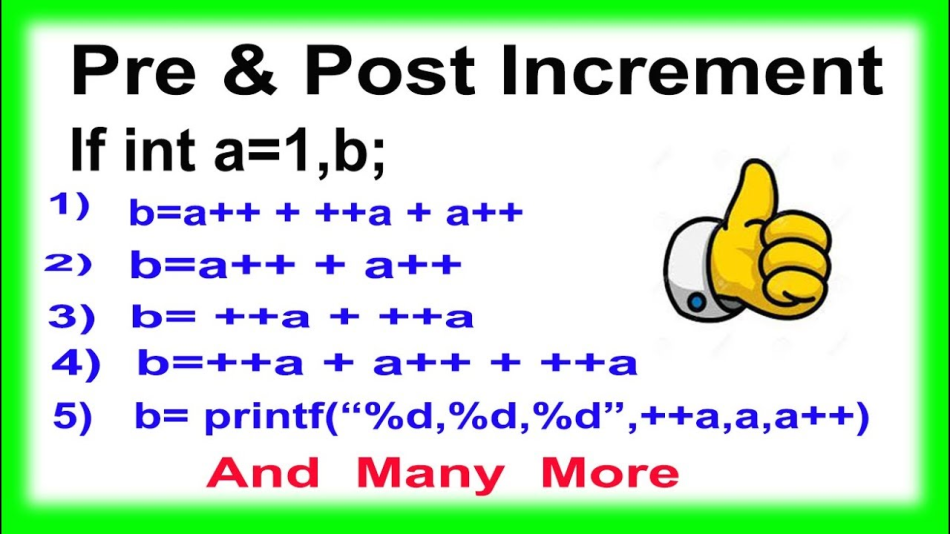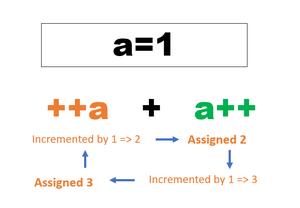Reasons Why Pre-Increment and Post-Increment Operators in Java Can Make or Break Your Code
 Tuanhdotnet
Tuanhdotnet5 min read

1. Understanding Increment Operators in Java
1.1 What Are Pre-Increment and Post-Increment?
Increment operators in Java are shortcuts to increase a variable’s value by one. The pre-increment operator (++var) increments the value before using it in an expression, while the post-increment operator (var++) increments the value after it is used in the expression. This distinction can have significant implications in how expressions are evaluated.

int x = 5;
// Pre-increment
int preResult = ++x; // x is incremented to 6, then assigned to preResult
// Post-increment
int postResult = x++; // postResult gets the current value of x (6), then x is incremented to 7
1.2 Key Differences in Execution Flow
To illustrate, let’s break down the execution step by step for clarity:
Pre-Increment (++var):
- The value of the variable is incremented.
- The incremented value is used in the expression.
Post-Increment (var++):
- The current value of the variable is used in the expression.
- The value of the variable is incremented.
This difference becomes critical in more complex expressions, especially when dealing with loops, conditions, or function calls.
2. Analyzing Common Use Cases and Behavior
2.1 Pre-Increment in Loop Control
Pre-increment is often used when the updated value is immediately required in the loop’s body or condition.
for (int i = 0; i < 5; ++i) {
System.out.println("Pre-increment i: " + i);
}
Here, ++i increments the value before evaluating it in the loop condition, which can lead to subtle performance improvements due to reduced temporary storage operations in some compilers.
2.2 Post-Increment in List Iterations
Post-increment is widely used when the current value must first be processed before incrementing.
int[] numbers = {1, 2, 3, 4, 5};
int index = 0;
while (index < numbers.length) {
System.out.println("Post-increment index: " + numbers[index++]);
}
In this example, the value at numbers[index] is accessed first, and then the index is incremented. This is particularly useful when dealing with zero-based indexing.
2.3 Complex Expressions with Increment Operators
When used within more intricate expressions, pre- and post-increment operators can lead to hard-to-debug issues.
int a = 5, b = 5;
int result1 = ++a 2; // Pre-increment: a becomes 6, result1 = 6 2 = 12
int result2 = b++ 2; // Post-increment: result2 = 5 2 = 10, then b becomes 6
System.out.println("result1: " + result1); // Outputs: 12
System.out.println("result2: " + result2); // Outputs: 10
Understanding how the operators influence expression evaluation is critical to avoid unintended results.
3. Pitfalls to Avoid When Using Increment Operators
3.1 Overusing Increment Operators in Expressions
Using multiple increment operators in a single expression often leads to code that is difficult to read and debug.
int x = 5;
int y = ++x + x++ + --x;
System.out.println("y: " + y); // Can you predict the value?
This type of code is not only confusing but also error-prone. In the above case, the result depends on the order of operations, which can vary across compilers.
Best Practice: Avoid combining increment operators in a single line; instead, split them into multiple statements for clarity.
3.2 Unexpected Behavior in Multi-Threaded Environments
When increment operators are used in multi-threaded applications, race conditions may occur. The increment operation is not atomic, which can lead to inconsistent results when accessed by multiple threads simultaneously.
class Counter {
int count = 0;
public void increment() {
count++;
}
}
Counter counter = new Counter();
// Thread 1 and Thread 2 both call increment() simultaneously
To prevent issues, always use synchronization or atomic variables, such as AtomicInteger.
4. Broader Implications and Best Practices
Performance Considerations
While the performance difference between pre- and post-increment is negligible in most cases, it can become significant in tight loops or performance-critical sections. Pre-increment can be slightly faster in such scenarios, as it avoids creating temporary copies of variables.
Readability and Maintainability
When writing code, prioritize readability. Use increment operators where their behavior is immediately obvious to the reader.
for (int i = 0; i < 10; ++i) {
System.out.println(i);
}
Avoid:
for (int i = 0; i < 10;) {
System.out.println(i++);
}
While both achieve the same result, the first approach is more intuitive.
5. Conclusion
Understanding the differences between pre-increment and post-increment operators is essential for writing clear, efficient, and bug-free Java code. While these operators may seem simple, their implications can ripple across complex systems, affecting performance, readability, and correctness.
Do you have questions or thoughts on when to use pre-increment or post-increment operators? Let me know in the comments below!
Read more at : Reasons Why Pre-Increment and Post-Increment Operators in Java Can Make or Break Your Code
0
Subscribe to my newsletter
Read articles from Tuanhdotnet directly inside your inbox. Subscribe to the newsletter, and don't miss out.
Written by

Tuanhdotnet
Tuanhdotnet
I am Tuanh.net. As of 2024, I have accumulated 8 years of experience in backend programming. I am delighted to connect and share my knowledge with everyone.